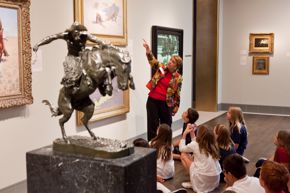For the Love of Art April 24, 2012
Have you ever considered becoming a docent at the MFAH? If you love art and enjoy sharing that love with others, read below for the inside scoop from two of our docents, Shari Chadderdon and Claudia Zopoaragon. Then find out more at the next open house! Click to RSVP for Wednesday, April 25 or Saturday, May 12.
Q) How long have you been a docent?
Shari Chadderdon: I started training in the fall of 2009.
Claudia Zopoaragon: Four years.
Q) What made you decide to become a docent?
SC: I was looking for a permanent volunteer position, as there were fewer opportunities for me to help in my children's classrooms as they got older. I have an interest in art and think it is a fun way to share ideas with children.
CZ: I've had a passion for art all my life. Coming to live in Houston, I began researching ways to be connected to the MFAH, and I learned about the docent program. Immediately I became excited about the opportunity to share my love for art with children and to have the chance to connect with other people who share my passion.
Q) What is your favorite topic or artwork to discuss with a tour group?
SC: Two high school tours that I enjoyed—"The Age of Impressionism" and "Classical Humanism"—gave us the chance to discuss cultural ideas in a historical context. For elementary-age students, I love touring art that is especially awe-inspiring and garners an immediate response from the students. For example, the MFAH collection of African Gold, the Tiffany stained-glass panels, and The Light Inside.
CZ: My favorite work for a group discussion is Cai Guo-Qiang's Odyssey [which lines the walls of the Arts of China Gallery ]. I had the privilege of seeing him create the work, so it is especially meaningful to me. I usually begin with that gallery and explain how, with proper technique, destructive material [such as gunpowder] can be transformed to create an inspiring and relaxing piece of art that tells a story. Students become so astonished when they learn about it. Afterward, the tour flows around creativity, expectation, and great comments and conversation.
Q) Can you tell us about a unique experience you've had?
SC: I get new ideas from every group, from the third grader who said Picasso's Seated Woman reminds us of the good side and bad side in us all, to the kindergartner who said Derain's Turning Road looks like Candy Land. I've also heard personal stories from high school students who were moved by the exhibition of Hurricane Katrina photographs. I'm surprised by how impressed some of the older students are with the skill involved in works of classical art, often preferring it to the Modern and Contemporary works.
CZ: Every tour is unique. I never know what students are going to say, ask, like, or dislike. Every time is an adventure, and every tour is like the first one over and over. However, there is one tour with a group of special-needs teenagers that will always be in my heart. I was nervous at the beginning, but I became amazed at their willingness to listen and think about what they were learning. They also had a unique creativity, enthusiasm, and ability to express themselves. At the end of the tour I received a group hug, and that was a very humbling experience!
Q) What would you tell someone who is considering becoming a docent?
SC: It is a wonderful way to spend your time if you have an interest in art and enjoy sharing it with children. There is also great camaraderie among docents when it comes to sharing research or filling in for one another.
CZ: I would say you are about to have experiences and challenges that will make you grow in many ways. You will learn to connect with a wide variety of people through listening and observation. You will also learn about art through the unique training given by curators, senior docents, MFAH staff, and through your own research, which I find particularly fascinating. Last, you will learn to enjoy every single tour as a rewarding experience and to you will form special friendships with fellow docents.
Q) What is your favorite part of being a docent?
SC: The dynamic, changing environment of the MFAH is invigorating, and I love sharing that experience with visitors, but what I love the most is when students leave excited about bringing their families back to visit.
CZ: The blessing I have to touch students' lives in some way in their approach to art. Most of the students are visiting for the first time, and I have the opportunity to make that experience exciting, pleasant, and welcoming in hopes that they will come back with their families and feel comfortable enjoying, creating, and relating to art in their future. I tell them the museum is belongs to them and is here for them.
To learn more about the MFAH Docent Program, click here or contact docents@mfah.org for an information sheet.






